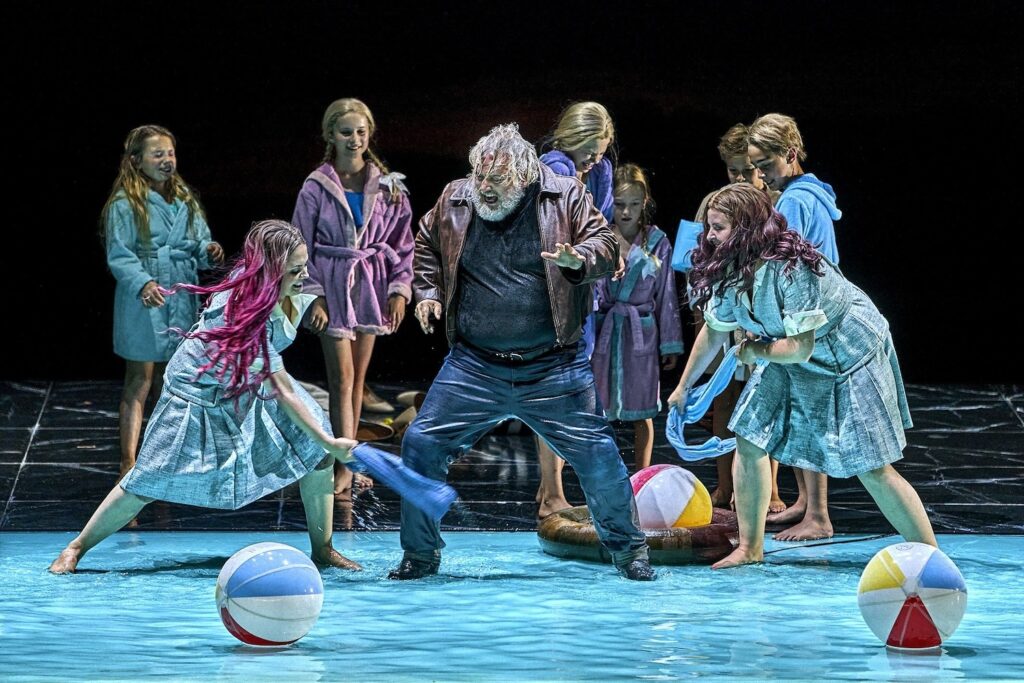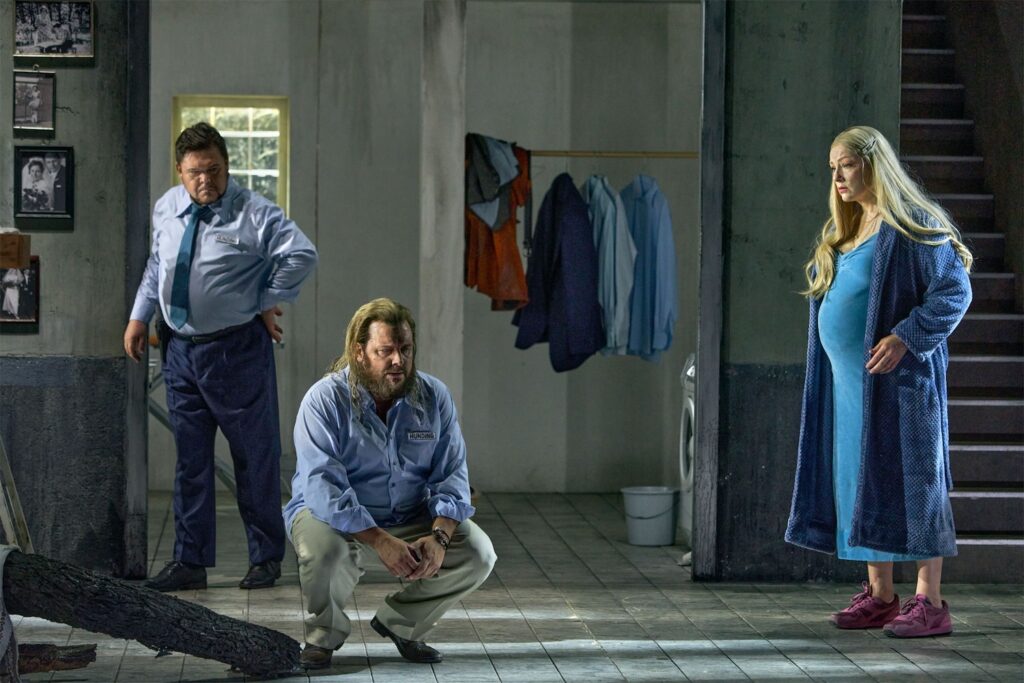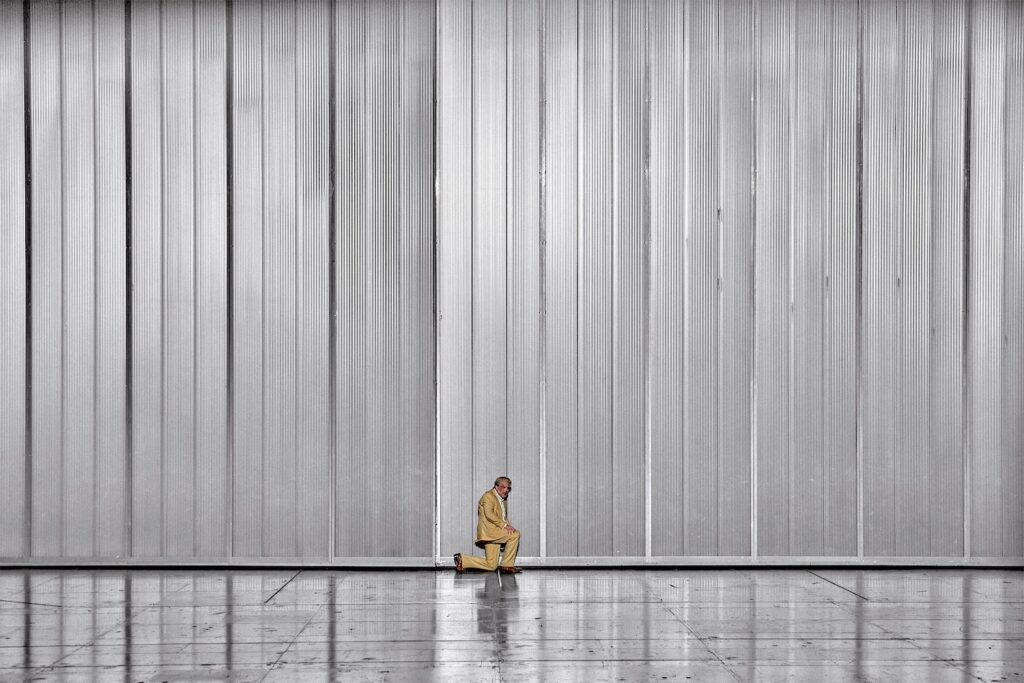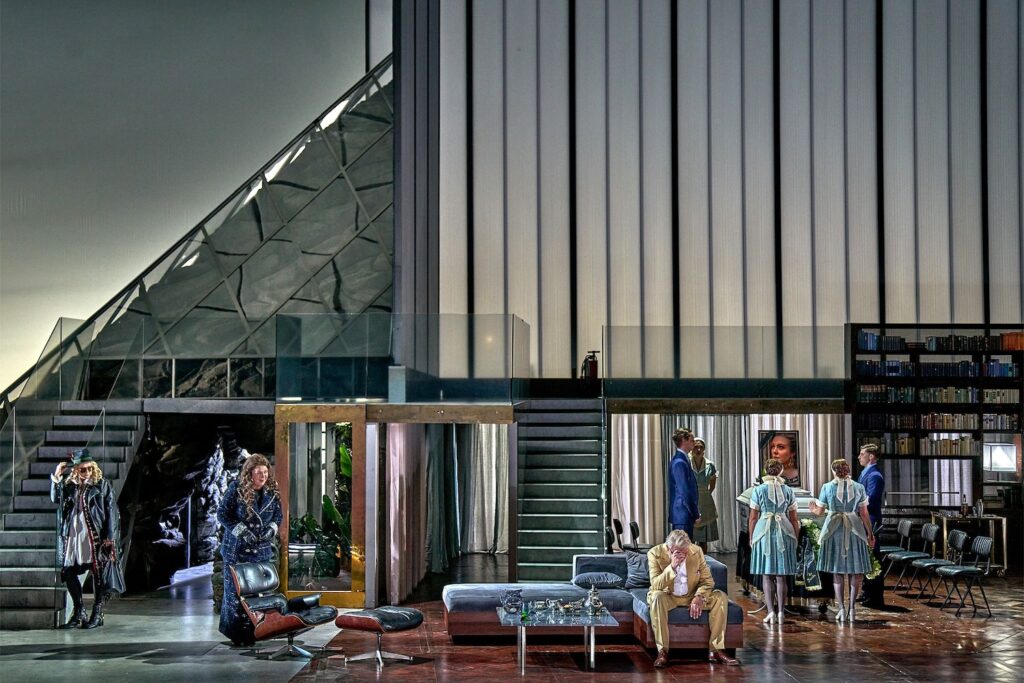The first two of this fourth edition of the 2022 Bayreuth Ring des Nibelungen, staged by Valentin Schwarz, with the understanding that the Bayreuth Festival mounts a new Ring every 4 or 5 years. No Bayreuth Ring is intended to be a definitive version.
For that version may we defer to the 1876 Bayreuth Ring, under the direct supervision of composer Richard Wagner. Since then, 139 years have added ever changing artistic and social perspectives onto the original Wagnerian philosophical canvas.
Mr. Schwarz strays mightily from any possible idea of a definitive version, though by default, his version does indeed recite Wagner’s Ring poem — the original tale is told straight-out in the opera’s libretto. Embellishing that tale Mr. Schwarz delves into the psyche of the great god Wotan, enriching his actions and exploding their results. Other tales will surely emerge as well, Rheingold and Walküre are Wotan centric, we have yet to meet Siegfried and the mortal Brünnhilde.
Mr. Schwarz’ Ring evidently will tell more stories simultaneously, piling them on top of Wagner’s narration. The Bayreuth Festival, in deference to retaining a supposed aura of Wagnerian purity — that is summarily dismissed in its stagings — eschews supertitles. Thus the festival’s audiences are deprived of following the dramaturgical subtleties of Mr. Schwarz’ production. [Come to think of it, there is no space in Wagner’s Festspielhaus’ stage picture for projected supertitles].
This current Bayreuth Ring was indeed explosive in the hands of Australian conductor Simone Young. An experienced Ring conductor (La Scala, Hamburg, Berlin, Vienna) she well knows the Wagner tale, musically participating with every line, the depth of her participation made blatantly apparent in Wotan’s intensely emotional monologues in the second and third acts of Die Walküre. Her orchestra howled the inner tortures of a Wotan who had murdered his mortal son Siegmund in cold blood, raped his mortal daughter Sieglinde [!], and excommunicated his divine progeny Brünnhilde, she the fruit of his liaison with Erda, the primordial earth goddess, I.e. fate itself.
Wotan, in this fourth edition was played by Polish bass-baritone, Tomasz Konieczny (lead photo, with image representing the ring), a singer of a big, sharp voice, of little beauty, but of immense, intense presence in his stark delivery of the Wagner poem. In the Schwarz production Wotan’s Valhalla is already built. It is a sleek modern home with a huge, precious-wood bookcase, a de rigueur Eames chair and chic sectional sofa. Once Wotan had finally paid for his estate through the Rheingold machinations, he climbed to an upper level to celebrate. To Wagner’s triumphant Valhalla-revealed music this tycoonic Wotan did a little, triumphant dance, deal done!

In the beginning Alberich, played by Iceland baritone Ólafur Sigurdarson in quite beautiful voice, appeared at the pool of Wotan’s estate where there are many children, watched over by the three Rhinemaidens. The children will become, obviously, the Nibelungen, save two of them, a male and a female, who reappear, in magical golden dress, as Siegmund, American tenor Michael Spyres in majestic voice, and Seiglinde, American soprano Jennifer Holloway in glorious voice, relive their childhood in unidentified sumptuous surroundings — not Hunding’s modest abode. Note that in this Schwarz version Sieglinde is pregnant with Hunding’s child, and that Hunding will walk away unharmed from his duel with Siegmund.
Mr. Schwarz will have a lot of explaining to do in Siegfried.

Valentin Schwarz’ set designer is Andrea Cozzi, also Viennese. Like the absence of beauty in Wotan’s voice, Mr. Cozzi’s sets embodied a world of wealth without taste, without surface sheen. The wealth of the Bayreuth Festival itself was apparent in the magnitude and movement of the myriad changes of settings that transpired throughout the two evenings, but nowhere more eloquent than in Wotan’s torment at disowning his daughter Brünnhilde, that found him, fetus position, in front of a blank wall.

Cut to the monumental fire music pouring forth from the Festspielhaus’ invisible pit in the final moments of Walküre [though conductor Simone Young has been sometimes visible in reflective surfaces on the stage], when Wotan’s wife Fricka, ruthlessly enacted by German mezzo soprano Christa Mayer, comes onto the now black stage bearing cocktails. They toast one another. Wotan, Siegfried’s Wanderer, departs stage right.
The Ride of the Valkyries! Eight bandaged women at a spa in the aftermath of cosmetic surgery, and a bevy of silent, suit-and-necktied young men, one of whom took his pants down to be whipped by a Valkyrie. The image was difficult to decipher, though laden with innuendo. Finally it was intellectual complexity substituting the usual staging spectacle.
Stage director Schwarz makes much use of such Kabuki-theater-like Koken (presences who help with props, and sometimes, as in the above scene, serving as animal props as well, i.e. fallen warriors). And, for further example, in Walküre, the two maids (of the three Rheingold norms) slipping in a quiet tea break during Wotan’s rape of his daughter.

Mr. Schwarz brought one of these silent creatures into the Wotan / Brünnhilde confrontation. Unlike Kabuki where the Kohen are esthetically invisible, here the young man was a vessel for our shattering emotions, offering a shawl to the banished Brünnhilde who later draped it over the shoulders of her grieving father. Brünnhilde was sung by British soprano Catherine Foster who sailed easily through the upper vocal reaches of the role with panache.
Of special note were the golf-club swinging Donner of American bass-baritone Nicholas Brownlee, Wotan in Paris Opera’s unfolding Calixto Bieito Ring, and the Freia of Swedish soprano Christina Nilsson, Meistersinger’s Eva of the night before this Rheingold. The casts included Vitalij Kowaljow as Hunting, Daniel Behle as Loge, Mirko Roschkowski as Froh, Ya-Chung Huang as Mime, Tobias Kehrer as Fafner, Patrick Zielke as Fasolt, and Anna Kissjudit as Erda.
Not knowing how (or if) Valentin Schwarz resolves this brilliant mess is a regret of my critical life.
Michael Milenski
Festspielhaus, Bayreuth, Germany, July 26 and July 27, 2025
All photos copyright Enrico Nawrath, courtesy of the Bayreuth Festival.